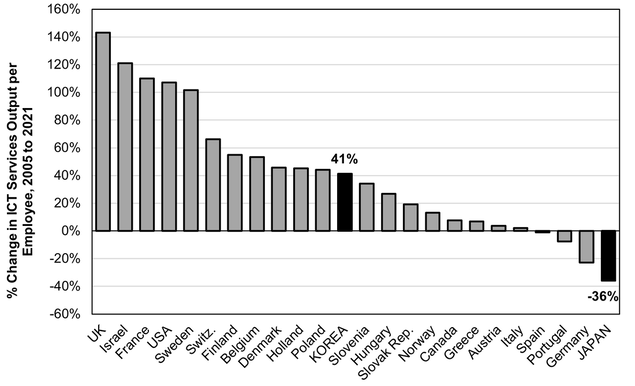|
OECD https://stats.oecd.org/BrandedView.aspx?oecd_bv_id=pdtvy-data-en&doi=data-00687-en
私は、リチャード・クラッツが執筆した記事を見つけました。その中で、彼は日本経済について的確な評価をしています。ここでは、日本の英語学習者が理解しやすいように、彼の重要なポイントを要約して紹介することにする。 ...日本には、デジタル技術の扱い方を知っている人が少ないという問題がある。日本の高校生は数学や科学が本当に得意なのに、デジタル技術や科学を使った仕事を選ぶ人はあまりいません。そのため、コンピューターやその他のテクノロジーを機能させることができる人材が不足しているのです。なぜなら、多くの企業がビジネスをより良くするために、このような人材を必要としているからです。 この問題は、多くの日本企業が非常に複雑な古いコンピューターシステムを使用しているために、さらに悪化しています。多くの日本企業は、非常に複雑な古いコンピューターシステムを使用しているため、コストがかかりすぎるため変更しようとせず、新しいシステムの使い方を知っている人も十分にいない。そのため、古いシステムは重要なデータを失ったり、故障が多かったりと、大きな問題を引き起こしている。 デジタル技術を使いこなす人材の不足は、経済の成長も難しくしています。日本では、テクノロジーの扱い方を知っている人が100万人以上必要なのに、113万人ほどしかいない。つまり、企業は最新・最良のテクノロジーを使って、ビジネスをより良くすることができないのです。もし日本がこの問題を解決しなければ、日本は多くのお金を失い、経済規模も本来よりずっと小さくなってしまうかもしれない...。 コンピュータの扱い方を知っている人が少ないという日本の問題を解決する一つの方法は、政府がデジタル技術について教えるクラスやプログラムを増やすことです。また、企業も従業員にコンピュータの使い方を学び、上達する機会を増やすとよいでしょう。また、コンピュータを使うのが得意な人を他の国から呼び寄せて、そのギャップを埋めることも考えられます。 すでに多くの国が、コンピュータを使いこなす人材を確保するために、このような取り組みを行っています。例えば、アメリカでは、学生が科学、技術、工学、数学(STEM)の専門家になるための特別プログラムを用意しています。中国は、学校に大規模な投資を行い、テクノロジー企業と協力して熟練労働者を育成しています。韓国には、すべての人にテクノロジーについて教えるプログラムがあり、新しいテクノロジーを作るために多くの資金を費やしてきました。シンガポールはテクノロジーに特化した実に優れた教育システムを持ち、世界中から本当に賢い人たちが集まってきています。
0 コメント
I came across an article authored by Richard Kratz, which can be found at the following link. In his article, he provides an accurate assessment of the Japanese economy. Here, I will provide a summary of his key points to make it easier for English language learners in Japan to understand.
… Japan has a problem: there aren't enough people who know how to work with digital technology. Even though Japanese high school students are really good at math and science, not many of them choose to work with digital technology or science. Because of this, there is a shortage of people who can help make computers and other technology work. This is a big problem because many companies need these people to make their businesses better. The problem is made worse because many Japanese companies use old computer systems that are very complicated. They don't want to change because it would be too expensive, and they don't have enough people who know how to use the new systems. This means that their old systems are causing big problems, like losing important data and breaking down a lot. The shortage of people who know how to work with digital technology is also making it hard for the economy to grow. Japan needs more than a million people who know how to work with technology, but there are only around 1.13 million. This means that companies can't use the latest and best technology to make their businesses better. If Japan doesn't fix this problem, the country could lose a lot of money and the economy could be much smaller than it should be... One way to fix Japan's problem of not having enough people who know how to work with computers is for the government to make more classes and programs that teach about digital technology. Companies could also give their workers more chances to learn and get better at using computers. Another idea is to bring in people from other countries who are good at working with computers to help fill the gap. Lots of other countries have already done things like this to make sure they have enough people who are good at using computers. For example, the United States has special programs to help students become experts in science, technology, engineering, and math (STEM). China has made big investments in its schools and has worked with technology companies to train skilled workers. South Korea has a program to teach everyone about technology and has spent a lot of money to make new technology. Singapore has a really good education system that focuses on technology and has attracted really smart people from all over the world. |
Peter HoangI'm an experienced English as a Second Language (ESL) teacher and coach in Japan, working with students from kindergarten to high school (K1-12). アーカイブ
4月 2024
カテゴリ
すべて
|



 RSSフィード
RSSフィード
